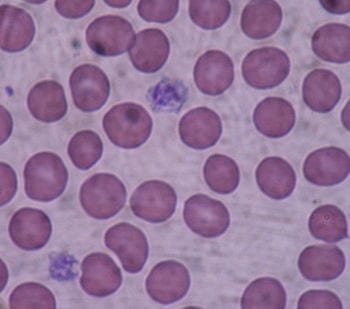
Researchers cautioned that study results involving laboratory mouse models do not always translate into clinical treatment of human patients
Researchers used blood platelets and bone marrow cells to deliver potentially curative
to mouse models of the human genetic disorder Hurler syndrome – an often fatal condition that causes organ damage and other medical complications.
Scientists from Cincinnati Children’s Hospital Medical Center and the National Institute of Neurological Disorders and Stroke (NINDS) report their unique strategy for treating the disease the week of Feb. 3-7 in Proceedings of the National Academy of Sciences (PNAS).
Researchers were able to genetically insert into the cells a gene that produces a critical lysosomal enzyme (called IDUA) and then inject the engineered cells into mice to treat the disorder. Follow up tests showed the treatment resulted in a complete metabolic correction of the disease, according to the authors.
“Our findings demonstrate a unique and somewhat surprising delivery pathway for lysosomal enzymes,” said Dao Pan, PhD, corresponding author and researcher in the Division of Experimental Hematology and Cancer Biology at Cincinnati Children’s. “We show proof of concept that platelets and megakaryocytes are capable of generating and storing fully functional lysosomal enzymes, which can lead to their targeted and efficient delivery to vital tissues where they are needed.”
The mice tested in the study modeled human Hurler syndrome, a subset of disease known as mucopolysaccharidosis type I (MPS I), one of the most common types of lysosomal storage diseases. MPS I is a lysosomal storage disease in which people do not make an enzyme called lysosomal alpha-L-iduronidase (IDUA).
IDUA helps break down sugar molecules found throughout the body, often in mucus and fluids around joints, according to the National Library of Medicine/National Institutes of Health. Without IDUA, sugar molecules build up and cause organ damage. Depending on severity, the syndrome can also cause deafness, abnormal bone growth, heart valve problems, joint disease, intellectual disabilities and death.
Enzyme replacement therapy can be used to treat the disease, but it is only temporary and not curative. Bone marrow transplant using hematopoietic stem cells also has been tested on some patients with mixed results. The transplant procedure can carry severe risks and does not always work.
Pan and her colleagues – including Roscoe O. Brady, MD, a researcher at NINDS – report that using platelets and megakaryocytes for gene therapy is effective and could reduce the risk of activating cancer-causing oncogenes in hematopoietic stem cells.
The authors said tests showed that human megakaryocytic cells were capable of overexpressing IDUA, revealing their capacity for potential therapeutic benefit. While engineering megakaryocytes and platelets for infusion into their mouse models of Hurler, the scientists report they were able to release IDUA directly into amply sized extracellular spaces or inside micro-particles as the cells matured or activated. The cells were able to produce and package large amounts of functional IDUA and retained the capacity to cross-correct patient cells.
After infusing mouse models of Hurler with the genetically modified cells, researchers said this led to long-term normalization of IDUA levels in the animal’s blood with versatile delivery routes and on-target preferential distribution to the liver and spleen. The treatment led to a complete metabolic correction of MPS I in most peripheral organs of the mice.
Researchers cautioned that study results involving laboratory mouse models do not always translate into clinical treatment of human patients, and that additional research is needed for this prospective therapy.
The Latest on: Hurler syndrome
[google_news title=”” keyword=”Hurler syndrome” num_posts=”10″ blurb_length=”0″ show_thumb=”left”]
via Google News
The Latest on: Hurler syndrome
- Orchard Therapeutics Announces Multiple Presentations at ASGCT 2024on May 7, 2024 at 4:22 am
About Lenmeldy Lenmeldy™ (atidarsagene autotemcel), formerly known as OTL-200, is the only approved therapy in the U.S. for the treatment of children with pre-symptomatic late infantile (PSLI), ...
- What Causes Cushing’s Syndrome?on April 18, 2024 at 5:00 pm
But when you have too much cortisol, it can throw off your body's other systems. Most cases of Cushing's syndrome can be cured, though it may take some time for your symptoms to ease up.
- hold fundraiser to celebrate a lifeon April 18, 2024 at 5:00 pm
Photo courtesy of the Daquara family. Haley was diagnosed with Hurler syndrome at six months old. It’s a disorder that causes a deficiency in the lysosomal enzyme, which breaks down fats and ...
- Myelin Sheath: What to Knowon April 14, 2024 at 5:00 pm
There are also rare diseases passed down through your family where the myelin sheath doesn't form properly, such as Tay-Sachs disease, Gaucher disease, Hurler syndrome, and Niemann-Pick disease.
- Hurler's family calls for widespread cardiac screening in sporton April 9, 2024 at 4:27 am
The family of Tipperary hurler Dillon Quirke, who died of Sudden Adult Death Syndrome two years ago, are calling for more widespread cardiac screening to ensure other families avoid a similar tragedy.
- Stephen Strasburg's saga with Nationals should serve as a cautionary taleon April 6, 2024 at 8:18 pm
Former All-Star and World Series MVP hurler Stephen Strasburg officially ... dealing with thoracic outlet syndrome, a severe nerve issue. He underwent surgery in 2021 in hopes of returning to ...
- Should You Bank Your Baby's Cord Blood? Here's What the Experts Sayon March 20, 2024 at 11:25 am
such as Hurler syndrome, Krabbe disease, metachromatic leukodystrophy, and adrenoleukodystrophy. In a cord blood transplant, patients are given high doses of chemotherapy or radiation therapy to ...
- Taking gene therapy to the next levelon October 10, 2022 at 5:06 am
The ShapeTX RNA-editing technology has been used to treat a mouse model of Hurler syndrome—the most severe form of the lysosomal storage disease mucopolysaccharidosis type 1—and Duchenne ...
- Leveraging learning in gene editingon February 16, 2021 at 4:31 am
In laboratory conditions, it was used to restore catalytic activity of cells from patients with Hurler Syndrome, an inherited condition that impairs a body’s ability to digest sugar.
- New stem cell gene therapy gives hope to prevent inherited neurological diseaseon September 5, 2018 at 4:26 am
Dr Brian Bigger, from the University of Manchester’s Institute of Human Development who led the research, said bone marrow transplants had been used to correct similar HS storage diseases, such as ...
via Bing News









